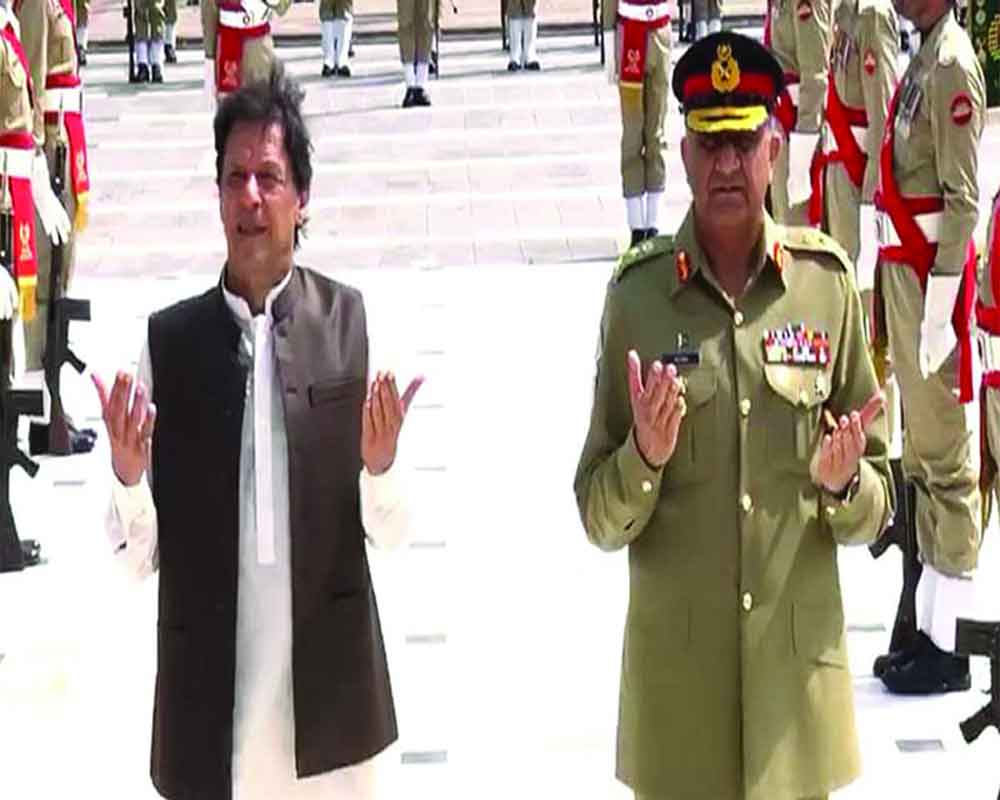The Pakistani military has perfected the art of ruling without ‘official’ accountability and with the additional weapon of plausible deniability
On August 17, 1988, the dark and toxic regime of Pakistani Gen Zia-ul-Haq came to an end with the “mysterious case of exploding mangoes", which remains mired in unresolved conspiracy theories. Till then, Pakistan’s fledgling democracy of 41 years had been under the DMS boots of Pakistani Generals for 23 years, or nearly 60 per cent of time. In the 34 years since, brooding Generals have held ‘official’ power only in the Gen Pervez Musharraf era (first as CEO and then as President, 1999-2008), ie 25 per cent of time. Has the power of the Pakistani military waned and that of true democracy increased? Short answer — it hasn’t. It’s just that the Pakistani military has perfected the art of ruling without ‘official’ accountability and with the additional weapon of plausible deniability, for all ills afflicting society and the sovereign. Pakistani Generals rule the roost from the manicured cantonment of Rawalpindi General Headquarters (GHQ) without any commitment or preference towards any of the national/regional/sectarian parties, save pitchforking one against the other to keep the charade of democracy intact, and for each of them to do the institution’s bidding whilst in ‘official’ power.
A glaring example of institutional protectionism is the manipulative pussyfooting in the cases of high treason and subversion of Constitution, onto Gen Musharraf. He became the first Pakistani General to be sentenced to death, only to have it annulled and lead a comfortable life of self-imposed exile in Dubai and London (reneging on his promise to return). The former dictator has tellingly accepted: ‘I’m very proud of my institution whatever they are doing to help me, to protect the honour and dignity of their ex-chief.” Even Prime Minister Imran Khan, who publicly swears to the tenets of democracy and legality, has been strangely accommodative, forgiving and even defensive about Musharraf — clearly, the shadows of Rawalpindi GHQ loom large over Imran’s moves, statements and posturing that sustains his shaky Government. The quintessential politician in Imran is left reserving his visibilised angst and ire in railing against his civilian rivals in the Sharif and Bhutto families, respectively.
On all matters, decisions and meetings of sovereign consequences, the GHQ ensures that its preferred ‘man’ is duly represented and decisive on the high tables. The sensitive appointment to the powerful post of the Director General ISI (Pakistani spy services, Inter-Services Intelligence), was one such moment. The euphemistically christened “ongoing consultation process between the PM and Chief of Army Staff” exemplified the unquestionable power of the Pakistani military in the alleged standoff with civilian politicians. Imran was humiliatingly forced into ‘appointing’ the unilateral choice of the Pakistani military, ie Lt Gen Nadeem Anjum as the DG ISI, and the PMO was left clarifying feebly that “the issue of the appointment had been amicably settled between the civil and military leadership”. In this unsubtle pulling of strings, the Pakistani military has no hesitation in using unusual levers like the extremist Tehreek-e-Labbaik (TLP) to tactically dial up pressure or easing the same through brokered ‘deals’; the same applies to its cross-border ‘assets’ that work independently of the control by civilian politicians. Civilian dispensations come and go with wounded reputations, but the Pakistani military remains and retains its privileged and protected status in public imagination as the only ‘patriotic’ organisation.
The barely disguised footprint of the Pakistani Generals is seen in the extra-constitutional role of conducting foreign policy, with Gen Bajwa dashing to Riyadh to make reconciliatory moves whenever politicos like Foreign Minister Shah Mahmood Qureshi slip up, or like when the previous DG ISI, Gen Faiz Hameed, landed surreally in Kabul to stitch the preferred Taliban Cabinet! Even a usually guarded China that refrains from commenting on official appointments by other countries, hailed the term extension of its frequent visitor, Gen Bajwa, as an “old friend” of the Chinese, who was accorded the rare privilege of meeting Chinese President Xi Jinping on a visit. Given the security dynamics and historical ties, the meaningful US-Pakistan confabulations, too, must entail the presence and acquiescence of Pakistani Generals — all in all, the military brass draws the various redlines while the temporarily out-of-favour politicians like Nawaz Sharif are left alluding to “khalai makhlooq” (aliens) to suggest the role of meddlesome Generals in politics.
Massaging of optics continues with the military garnering lion’s share in annual budgets, even as payment of pension to its veterans comes out of civilian Government’s current expenditure, major military acquisitions are funded separately, and spends on nuclear programme are placed under a secret head — with all this ‘arrangement’, why would the Generals want the blame for the failing economy, infrastructural nightmare, societal regress and reputational issues, when they can get all of it blame-free? The favourite bogey of India, ‘West’, and now even the ‘extremism’ in Afghanistan, will continue bolstering the institutional relevance of the Pakistani military, and the gullible public will continue giving the long rope to the Generals. Truth is, Pakistan is a flourishing museum of unrest, failure and turmoil, and this suits the Generals perfectly as they posture their institutional restraint and service, as the only guarantor and saviours of pride, sovereignty and, ironically, even democracy!
(The writer, a military veteran, is a former Lt Governor of Andaman & Nicobar Islands and Puducherry. The views expressed are personal.)


























